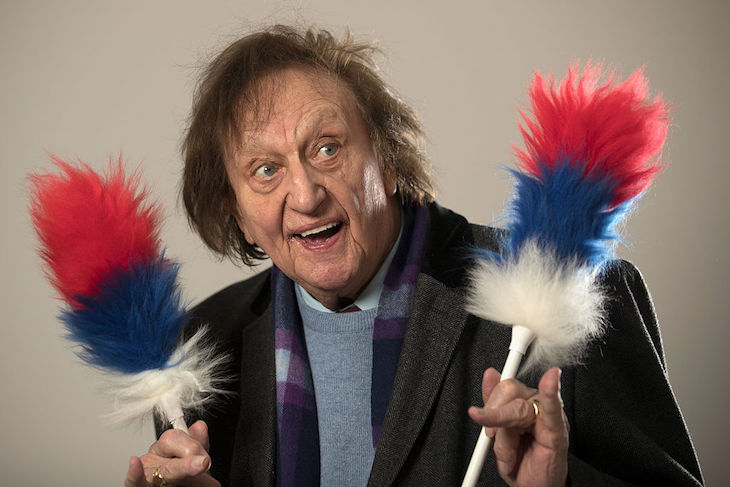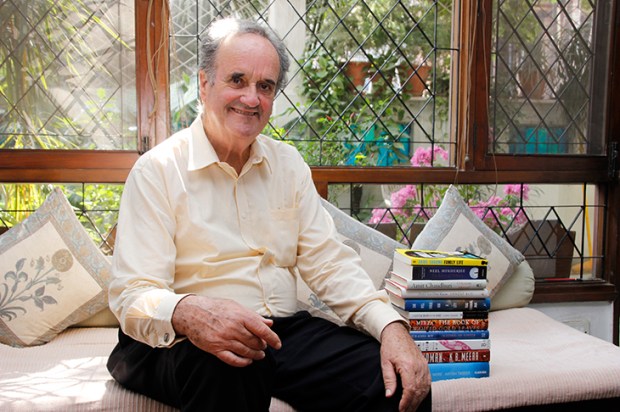It’s always odd to hear a familiar voice on a different programme, playing an alternative role. They never sound quite as comfortable behind the mike, as if they are wearing clothes that don’t quite fit. The voice has a different timbre, as it did on Sunday when Garry Richardson, who since 1981 has been keeping Today listeners updated on all the latest sports news, revealed his other passion. Since he was ten, when he was first taken to see the man from Knotty Ash at Blackpool in 1967, he’s been a fan of that extraordinarily tenacious star of the entertainment world, Ken Dodd. In Sir Ken Dodd: What a Beautiful Day! (produced by Peter McHugh), Richardson gave us an insight into why audiences are still paying to see a 90-year-old (Dodd’s significant birthday was on Wednesday) with wild hair, a high-pitched creaky voice and a relentless optimism, firing off a stream of comic gags for three or sometimes four hours, taking hold of his audiences and refusing to let them go home until they’ve laughed themselves weak.
I confess I never could understand Dodd’s popularity. The endless stream of jokes, the Diddymen, those corny songs ‘Tears for Souvenirs’ and ‘Happiness’. But I tuned into Radio 4 Extra after reading an interview with Dodd by the Guardian critic Michael Billington, which had me creasing up with laughter at the breakfast table. I had no idea Dodd could be so funny. You need to hear his quick-fire lines, building one upon another, for the comedy to work. He’s so off-the-wall, yet at the same time down-to-earth, picking up on the way our minds work if we let them go free-range. There’s no smut, nothing scatological, just a hint of Donald McGill. Dodd has no need to rely on cheap jokes or satire to make us laugh. His mind is like a jukebox of funny thoughts, and his prattle like Ulysses on speed.
Dodd, who first appeared on radio in December 1954 (he can still remember the catch line of a joke he made then), is always so damned cheerful, which I used to find deeply irritating, but it’s a quality that now seems very necessary. Also necessary but in a very different way was a quiet, unannounced programme on Radio 4, narrated by the poet Grevel Lindop. The Little Chinese Maiden (produced by Matt Thompson) told the story of Wordsworth’s daughter Catherine, who died aged three. She is, says Lindop, ‘a tiny footnote in history’ yet she’s still talked about, loved and known through the two poems that her father wrote about her, ‘Characteristics of a Child Three Years Old’ and ‘Surprised By Joy’. Lindop now suspects that Catherine was born with Down’s Syndrome and in his programme he talked to parents whose children also have the condition, testing out what Wordsworth writes about his daughter.
Catherine, we know, had very few words, yet she made a deep impression on the family, ‘one by herself’, a little character, just like Esme who we can hear in the background singing to herself yet never saying a word. Her good temper, never crying or being grumpy, endeared her to everyone, especially the family friend Thomas De Quincey, to whom she became very attached. Her father thought of her as ‘the little Chinese maiden’ because she was small in stature, had small hands; her eyes, too, were almond-shaped. She was, said Wordsworth’s sister Dorothy, ‘the most memorable child of them all’, a presence within the family who made a lasting difference to each one of them. ‘This child with no words was giving them some sense of meaning,’ said Lindop at the end of a programme that made a deep, touching impression.
Sunday on Radio 3 gave us a masterclass in radio drama by the formidable team of Martin Jarvis and Rosalind Ayres. I hope Matthew Graham, whose new play Jayne Lake was on Radio 4 the day before, was listening to Fathers and Sons (adapted by Brian Friel from Turgenev’s novel) and taking notes. His drama, a thriller about a group of students meeting up again for a reunion weekend, one of whom has gone blind after an acid attack, had the makings of a good play, but Graham, a successful TV writer (Life on Mars, Ashes to Ashes), has not, I suspect, often sat through a radio play and listened to it with any attention. There were so many moments when it was just not clear what was happening that I gave up in frustration after about 20 minutes.
In contrast, Fathers and Sons had a stellar cast, with Charles Dance, Martin Jarvis and James Fleet, but it was the clarity and immediacy of the production that drew me in. At no point were we as listeners left floundering in the dark, unsure who was speaking or where we were. I listened in one stretch and by the end it was as if I had been in Russia for the afternoon, observing the lives of Arkady, Yevgeny and their families like a fly on the wall, laughing and grieving. It was odd to find myself back in my study on a grey afternoon in Kingston.
Got something to add? Join the discussion and comment below.
Get 10 issues for just $10
Subscribe to The Spectator Australia today for the next 10 magazine issues, plus full online access, for just $10.
You might disagree with half of it, but you’ll enjoy reading all of it. Try your first month for free, then just $2 a week for the remainder of your first year.














Comments
Don't miss out
Join the conversation with other Spectator Australia readers. Subscribe to leave a comment.
SUBSCRIBEAlready a subscriber? Log in